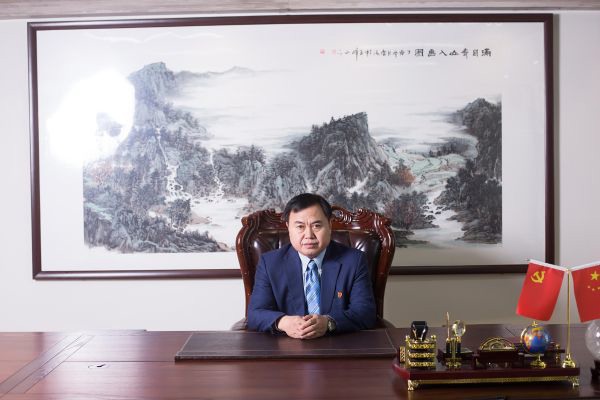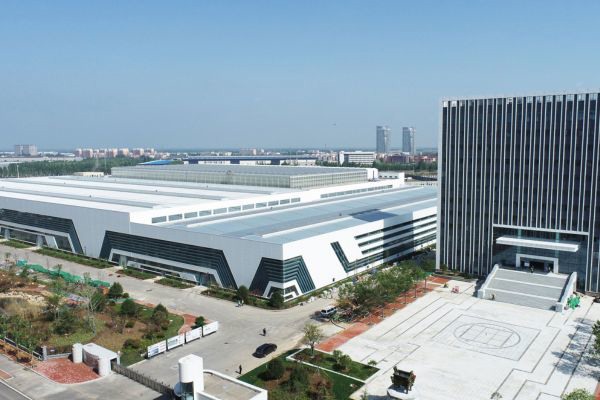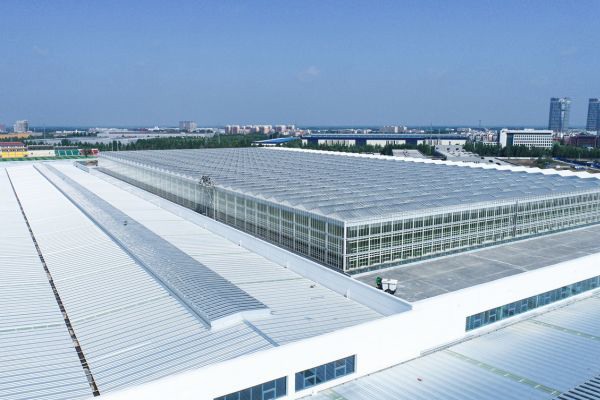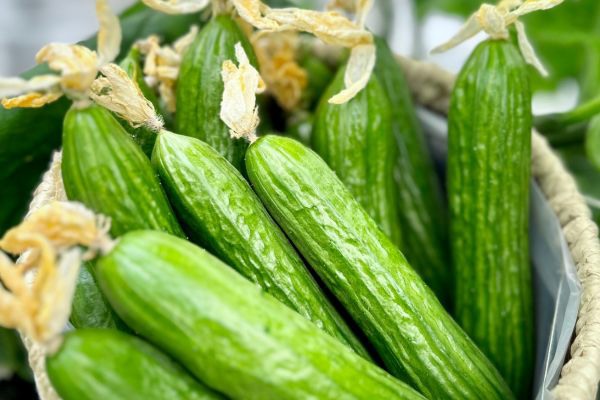Sky Farm, a 30-acre vertical farm, has been constructed atop a five-story building in the Guoshun Green Building Low Carbon and Steel Intelligent Technology Demonstration Industrial Park in Changqing District, Jinan City, Shandong Province. The farm is filled with high-quality produce such as tomatoes and cucumbers. "This is the first facility-type sky farm in China, pioneered by Guoshun," shared Lü Hewu, of Shandong Guoshun Construction Group.
 Photo: Lv Hewu, Secretary of the General Party Branch of Shandong Guoshun Construction Group Co., Ltd.
Photo: Lv Hewu, Secretary of the General Party Branch of Shandong Guoshun Construction Group Co., Ltd.
 Photo: The exterior of the sky farm covering an area of 2 hectares, the first sky farm in China, the first of its kind by Guoshun
Photo: The exterior of the sky farm covering an area of 2 hectares, the first sky farm in China, the first of its kind by Guoshun
He emphasized the importance of combining industry and agriculture, stating, "Industry should support agriculture as it holds great social significance and is an essential endeavor. The integrated development of primary, secondary, and tertiary industries is exemplified by the establishment of the sky farm. It not only utilizes excess carbon dioxide generated during steel processing but also marks our first partnership with a Dutch enterprise. This Greemhouse was desinged by Flexibell,which help give the professional advice on greenhouse design, intelligent control, and greenhouse operation management. In the future, we will discuss more about energy consumption, wind pressure resistance and the layout of the farm. "

Regarding the energy consumption of the sky farm, Lü Hewu mentioned, "The current sky farm utilizes solar photovoltaic power, which is used for heating and providing warmth during winter. However, in colder climates like Jinan, additional energy sources may be required, necessitating the expansion of energy storage facilities. Our goal is to collect excess heat during summer and utilize it in winter to significantly reduce energy usage costs."
Utilize urban and industrial idle resources to develop community agriculture according to local conditions
Highlighting the advantages of modern agriculture, Lü Hewu stated, "Modern agriculture offers high efficiency, high output, and high precision, surpassing traditional agriculture. One unit of modern agriculture is equivalent to the output of 30 times that of ordinary agriculture, addressing the problems of low efficiency and limited employment in traditional agriculture."
Lü Hewu also emphasized the benefits of the integration of industry and agriculture, saying, "By locating the farm 18 meters above the ground, we reduce the chance of pest invasion, minimize the use of chemicals, and provide a healthier food supply. This approach allows us to make use of idle resources in urban and industrial areas and adapt to local conditions, effectively utilizing carbon dioxide produced by industrial activities and reducing carbon emissions during product transportation."
 Photo: Tomatoes grown in Sky Farm
Photo: Tomatoes grown in Sky Farm
Looking to the future, Lü Hewu announced plans for expansion, stating, "Based on the Sky Farm demonstration project, we aim to construct over 100 'sky farms' in China, considering different environments and production conditions. These urban agricultural production clusters are not limited to tomatoes and cucumbers but can include various crops such as flowers, berries, and fruits, depending on the local conditions and climate."
Furthermore, Lü Hewu discussed the potential of urban agri-tourism, explaining, "Our sky farm is open to the public, offering visitors, including children and adults, the opportunity to learn and experience modern agriculture. Through this direct and effective way of promoting agricultural development, we aim to enhance understanding of the benefits of modern agriculture, reduce prejudices against agriculture, and encourage more young people to pursue careers in this field."
 Photo: snack cucumbers grown in Sky Farm
Photo: snack cucumbers grown in Sky Farm
Concluding the discussion, Lü Hewu highlighted the future prospects of protected agriculture, stating, "The market for greenhouse horticulture is promising, and we can further explore aspects such as testing equipment, automation, environmental control systems, and waste recycling after harvest. We are committed to addressing challenges, such as corrosion in steel structures and improving the durability of greenhouse materials to withstand natural risks like hail. We welcome discussions with global agricultural equipment manufacturers to advance the modernization of China's agriculture industry."
Liu Jing
